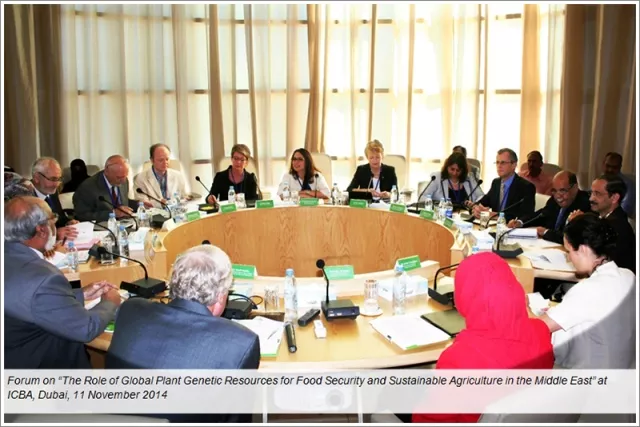Plant Genetic Resources—Vital for Food Security and Sustainable Agriculture
11 November 2014
Representatives from 17 national and regional agricultural research and government institutions gathered at ICBA headquarters to discuss how plant genetic resources can contribute to increasing agricultural productivity, food production and food self-sufficiency in the Middle East. The forum also tackled how agriculture can adapt to a changing climate so as to build a sustainable, resilient food production system in the region, by drawing on available crop diversity.
The key priority areas that were identified during the panel discussion included: identifying the challenges agriculture is facing; advancing the understanding of politicians, decision makers and the general public regarding the important role plant genetic resources can play in building resilient and sustainable agricultural systems, promoting better nutrition, and providing food security; and finally, increasing the financial resources available for plant genetics.
Moving forward the participants agreed on the need to create a unified message from all organizations that will represent a collective voice which communicates one main theme, and that this message should be supported by some supportive economic figures.
“My suggestion on this topic is that the organizations involved need to come together and develop an overall communication plan, that not only identifies this overarching one message, but also identifies the role of each organization and the activities it will carry”, said Setta Tutundjian, Director of International Cooperation and Partnership at ICBA, who added “This will encourage coordination of efforts to increase impact.”
“We hope that this will continue to raise awareness of policy makers in this region about the importance of conservation of crop diversity”, said Luigi Guarino, Senior Scientist at Crop Trust; who added, that the conservation and use of crop diversity could help in making agriculture more sustainable regionally and globally vis-à-vis increasing stresses, mainly climate change. Click below to watch the full interview with Luigi Gurano.
The event, held on 11 November 2014, was organized by the Global Crop Diversity Trust (Crop Trust) and the International Center for Biosaline Agriculture (ICBA).
The key priority areas that were identified during the panel discussion included: identifying the challenges agriculture is facing; advancing the understanding of politicians, decision makers and the general public regarding the important role plant genetic resources can play in building resilient and sustainable agricultural systems, promoting better nutrition, and providing food security; and finally, increasing the financial resources available for plant genetics.
Moving forward the participants agreed on the need to create a unified message from all organizations that will represent a collective voice which communicates one main theme, and that this message should be supported by some supportive economic figures.
“My suggestion on this topic is that the organizations involved need to come together and develop an overall communication plan, that not only identifies this overarching one message, but also identifies the role of each organization and the activities it will carry”, said Setta Tutundjian, Director of International Cooperation and Partnership at ICBA, who added “This will encourage coordination of efforts to increase impact.”
“We hope that this will continue to raise awareness of policy makers in this region about the importance of conservation of crop diversity”, said Luigi Guarino, Senior Scientist at Crop Trust; who added, that the conservation and use of crop diversity could help in making agriculture more sustainable regionally and globally vis-à-vis increasing stresses, mainly climate change. Click below to watch the full interview with Luigi Gurano.
The event, held on 11 November 2014, was organized by the Global Crop Diversity Trust (Crop Trust) and the International Center for Biosaline Agriculture (ICBA).











